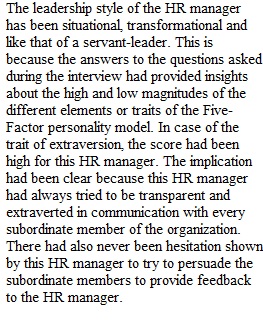


Q Resources: • Leadership Newsletter Template • Leadership Style Interview for a Company’s Newsletter Grading Guide Select someone in a leadership position at your organization or at a local company where you might seek employment. This individual could be a director, manager, supervisor, or the CEO of the organization. Write a 1,050- to 1,400-word profile of the individual you interviewed for your company's newsletter, and include the following: • Identify the individual and their position within the company, and briefly describe the organization. • Interpret the individual's leadership style based on the Five-Factor personality model, and offer one or more examples of the management and leadership roles of this individual. • Explain one incident where this individual had to solve a difficult problem or situation because things did not go as planned. • Describe the lessons she/he learned from being able to problem solve, even when what she/he had been taught did not work. Format your profile in the form of a newsletter (the final format may vary depending upon the company's style; please feel free to use either the provided template or to check the Internet or Microsoft® Word for additional newsletter templates). Submit your assignment. Resources: • Center for Writing Excellence • Reference and Citation Generator • Grammar and Writing Guides
View Related Questions